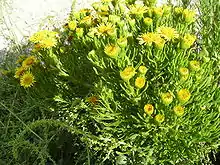Golden samphire
The golden samphire (Limbarda crithmoides) is a perennial coastal species, which may be found growing on salt marsh or sea cliffs across western and southern Europe and the Mediterranean.[2][3][4][5][6]
| Golden samphire | |
|---|---|
 | |
| Scientific classification | |
| Kingdom: | |
| (unranked): | |
| (unranked): | |
| (unranked): | |
| Order: | |
| Family: | |
| Genus: | |
| Species: | L. crithmoides |
| Binomial name | |
| Limbarda crithmoides | |
| Synonyms[1] | |
| |
Golden samphire has a tufted habit, and the plant may grow up to 1 m tall. It has narrow fleshy green to yellow green leaves and large flower heads, with six yellow ray florets which may be up to 1.5–2.5 cm (1–1 in) across. The flowers are self-fertile (able to pollinate themselves) and may also be pollinated by bees, flies and beetles. They bloom between June and October and can smell like shoe polish.[7]
Taxonomy
It was first described by Carl Linnaeus as Inula crithmoides in his book 'Species Plantarum' 2 on page 883 in 1753 and then later when the genus was renamed, it was published as Limbarda crithmoides by Barthélemy Charles Joseph Dumortier in Fl. Belg. on page 68 in 1827.[8]
It was verified by United States Department of Agriculture and the Agricultural Research Service on 11 June 2015.[9]
Known subspecies;[1]
- Limbarda crithmoides subsp. crithmoides
- Limbarda crithmoides subsp. longifolia (Arcang.) Greuter
Distribution and habitat
It is native to temperate parts of Europe, Africa and Asia.[9]
Range
It is found in Africa, within Algeria, Egypt (incl. Sinai), Libya, Morocco and Tunisia. In Asia, it is found in Cyprus, Israel, Lebanon, Syria and Turkey.
Europe, within Ireland, United Kingdom (where it is mostly found in the Isle of Sheppey),[10][11] Albania, Croatia, Greece (incl. Crete), Italy (incl. Sardinia and Sicily), Malta, Montenegro and Slovenia. Also within south-western European countries of France (incl. Corsica), Portugal, Spain (incl. Baleares).[9]
Uses
Young leaves may be eaten raw or cooked as a leaf vegetable.[12] It was formerly sold in markets in London for uses in pickles.[13]
In Lebanon, it was evaluated for use in saline agriculture.[14]
References
- "The Plant List: A Working List of All Plant Species". Retrieved 13 January 2015.
- Tela Botanica, Inule fausse criste, Limbarda crithmoides (L.) Dumort. in French, with photo and French distribution map
- Altervista Flora Italiana, Enula bacicci, Golden Samphire, Limbarda crithmoides includes photos and European distribution map
- Malta Wild Plants, Comprehensive profile for Inula crithmoides
- Flowers in Israel, Limbarda crithmoides, Inula crithmoides, Jacobaea crithmoides, Eritheis maritima, Golden samphire, בן-טיון בשרני , طيون ملحيطيون ملحي
- National Biodiversity Network, Natural History Museum, Joint Nature Conservation Committee, Inula crithmoides L. [Golden-samphire] includes links plus distribution map for United Kingdom and Irish Republic
- Chris Gibson Seashore: A Unique Photographic Guide to the Coastal Wildlife of Britain and Europe (2008), p. 14, at Google Books
- "Limbarda crithmoides | International Plant Names Index". www.ipni.org. Retrieved 29 May 2020.
- "Limbarda crithmoides". Germplasm Resources Information Network (GRIN). Agricultural Research Service (ARS), United States Department of Agriculture (USDA). Retrieved 30 May 2020.
- Grieve, Margaret (2013). A Modern Herbal, Vol. II. ISBN 9780486317311.
- J. S. Rodwell and C. D. Pigott British Plant Communities: Volume 5, Maritime Communities and Vegetation of open habitats (2000), p. 107, at Google Books
- The Wild Flowers of Britain and Northern Europe published by Collins 1974
- Margaret Grieve A Modern Herbal, Volume 2 (1971), p. 710, at Google Books
- Zurayk, R. A.; Baalbaki, R. (1996). "Inula crithmoides: A candidate plant for saline agriculture". Arid Soil Research and Rehabilitation. 10 (3): 213–223. doi:10.1080/15324989609381436.